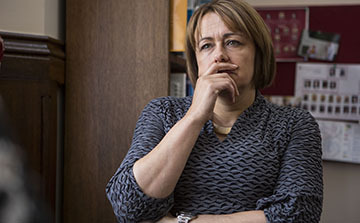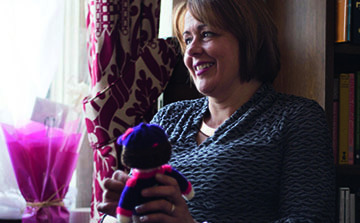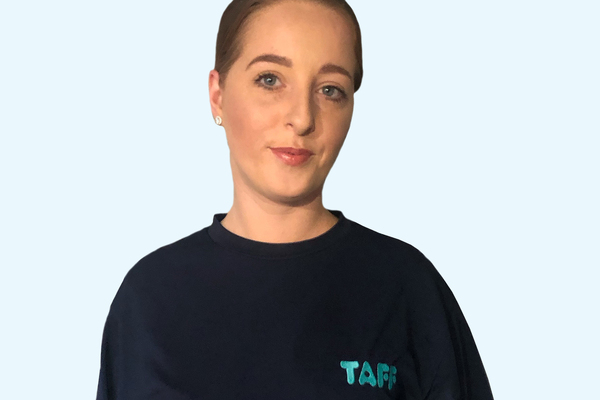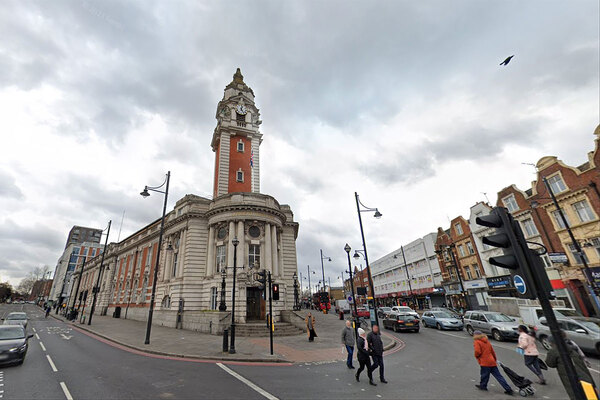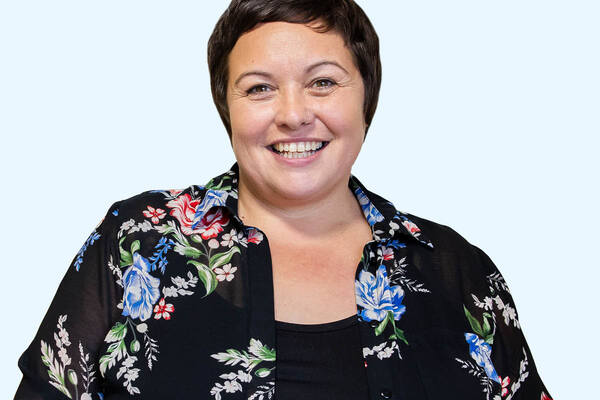You are viewing 1 of your 1 free articles
Battle of the champion
Tanni Grey-Thompson has fought hard for welfare and disability rights. Dawn Foster reports

Source: Tim Foster
A dappled autumn light streams onto Baroness Tanni Grey-Thompson’s desk in the House of Lords, falling on neat but hefty piles of documents, and two handmade items that stand out amid the sober signifiers of her
legislative work. The first, a small cross-stitch patch that says ‘Mum’ is her daughter’s needlework. The second, a larger knitted figure in a purple uniform, is a reminder of her first career, as a hugely successful paralympian.
‘This is a Gamesmaker from the 2012 Olympics. There was a bit of a craze where people knitted Gamesmakers, so they’re called “knitteds”,’ she explains cheerfully. ‘Somebody made this and sent it to me, it’s really sweet. It just sits on my desk.’
A system in need
Nominated as a cross-bench peer in 2010, most of Baroness Grey-Thompson’s work in the Lords has focused not on sport, but welfare, especially the Welfare Reform Act - passed into law on 8 March 2012 - which includes such measures as the bedroom tax, changes to disability benefits assessments and unemployment benefits. Disability is a social housing issue: 46% of social households comprise at least one person with a disability.
So with the 2015 election around the corner, Inside Housing has come to find out the state we’re in, from a politician not bound to party lines.

Source: Tim Foster
Baroness Grey-Thompson is instantly warm and chatty, cracking jokes and pointing out small quirks of the rather imposing Westminster Palace, including the fact the Lords and the Commons have different coloured bins, and carpets.
Having scrutinised the Welfare Reform Act, including the infamous bedroom tax, through numerous readings in the Lords, Baroness Grey-Thompson admits there are problems in British housing, but is sceptical the government’s response is right.
‘You wouldn’t create a social housing system the way we have it, with people living in the wrong size housing. However, I think there needs to be a bit of pragmatism, so if somebody’s had a lot of adaptations done to the house then you really need to question the cost and the value of the moving,’ she explains.
‘You have to look at the benefits of the environment they live in: is it accessible where they live? Would you be moving somewhere they can’t get into the shops? It’s all these different things.’
Part of the problem is where the policy comes from - ideology rather than evidence. ‘I think a chunk of it’s ideological, then trying to turn ideology into practice is always quite hard, then reality once legislation’s gone through. Actually, should people be living in the wrong sized housing?
‘No they shouldn’t, but we’re not starting with a clean sheet of paper: if we were then it would be different. You then have to look at building, decisions and some of it goes back to selling off council houses.
‘I had a chap who wrote to me, had a two-bedroom house, had a dialysis machine in his spare room and was told he was going to have to move as he couldn’t afford the extra money,’ Baroness Grey-Thompson says, exasperated. ‘But then he was told they’d pay for a taxi to take him to hospital six days a week. But that was fine because it’s a different budget. Probably my biggest frustration here is [lack of] joined up thinking.’
Particularly for disabled people, she argues the bedroom tax hasn’t been properly thought through either in cumulative cost terms, or socially. ‘I just don’t think the bedroom tax is going to save money in the long run. The cost of moving people, the cost of changing their environment, then if they have different care needs. Just moving into a different sector, getting into arrears: that doesn’t solve anything,’ she says.

Source: Tim Foster
‘One time quite late at night we were in the Chamber. And I was about to say: “Tell you what, let’s count up the spare bedrooms we have, shall we? And see if we want to have somebody who we don’t know come live with us.” Then there was a little part of me that went, “No, do you know what, however funny it might be, maybe not”.’
Long-term thinking
Active on Twitter, Baroness Grey-Thompson has become something of a figurehead for disability campaigners and the general public, and says she receives dozens of emails and letters about people’s experiences every week. ‘A woman wrote to me, she’s 85 and she’s lived in her house for 60 years. Her two kids have moved out but they lived locally.
‘[The council] were trying to move her where she didn’t know anybody but they were going to send someone in three times a day to look after her. Whereas where she lived, everybody knew her. The kid next door would go to the shops to get a pint of milk for her. And you’re thinking ‘She’s 85!’ I just worry we don’t make pragmatic use of funds.’
In her Paralympic career, success was measurable, and tangible: Baroness Grey-Thompson won 16 medals, including 11 golds, and the London Marathon six times. But the progress in the Lords is as fierce, and a philosophical and moral battle.
‘Wouldn’t it be great for disability if you could have the assessment process that instead said, “if you give someone this much what could they do with it?” as opposed to you always having to prove what you can’t do,’ Baroness Grey-Thompson muses. ‘And actually, if society was accessible, in an ideal world, I’d love for there not to be Disability Living Allowance. But the reality is life as a disabled person costs more. Living costs more and that’s the pay-off for having an inaccessible society.’
Tanni Grey-Thompson on…
On respect:
You wouldn’t get people without a blue badge parking in a blue badge space. It’s all about respect, and it’s about our attitude to disability. It’s not about having a space close to the door, it’s about needing to open my door really wide to get my chair out and it’s like people don’t understand that. That for me is a real marker of what we think of disabled people.
On the Lords:
I think the Lords is more diverse than people assume, and possibly more than the Commons. I think it’s incredibly hard for the public, especially people who are busy and often just trying to survive, to take time to figure out what we do and what’s going on here. I worry that 16 and 17-year-olds have switched off politics.
On speaking out:
I try not to rant about [disablism] or get angry publicly, but if I don’t do it who else will? I’ve got the ability to write to the head of a train company and say,”Actually, this isn’t right”. Disabled people don’t want to complain. It’s really hard if you have to spend your whole life complaining. One of the times I got left on a train was also one of the times there was a lot of nasty feedback online. ‘People like you don’t deserve to travel with normal people, you should be in a cattle truck at the back.’ And actually, I see why some disabled people don’t want to put themselves out there.
On attitudes towards disability:
I think the economics don’t help and whenever you’re in a challenging economic time, people turn in on themselves. But I think if you look at a lot of the media portrayal [of disabled people] and you’re either a paralympian doing amazing things for your country or you’re a benefit scrounger and you’re sucking money out of the state and you’re worthless.
